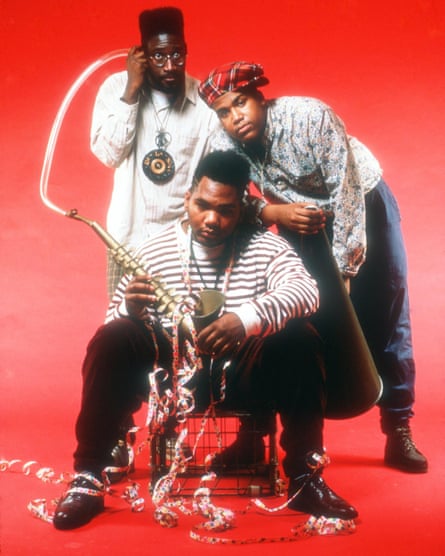Thirty five years after its release, De La Soul’s debut album is firmly ensconced in the pantheon of unimpeachable classics, and Me Myself And I is a fixture on mainstream classic radio. So it’s easy to forget what a shock 3 Feet High and Rising represented on release. It was, gasped one US critic’s review, “unlike any rap you or anyone else has ever heard”. If that wasn’t entirely true – 3 Feet High and Rising certainly had antecedents, both in the easygoing humour of Biz Markie’s style and in the beat-digging, fast-cutting, eclectic sound of old-school DJs, as wont to play Dizzy Gillespie or the Monkees’ Mary Mary as James Brown and Funkadelic – it wasn’t far off the mark. The album certainly didn’t sound like anything else that was around at the time – even those by their friends in the Native Tongues rap collective.

That album sounded like it existed in its own world, De La Soul presenting as rap’s weird kids running amok in the back of the classroom. It was uninterested in the genre’s standard brash posturing. As if to underline that fact, Dave Jolicoeur rapped under the name Trugoy the Dove: “trugoy” is “yogurt” backwards (“I eat it a lot,” he explained). Rather than using the same slang as everyone else, Trugoy and fellow MCs Kelvin “Posdnuos” Mercer and Vincent Lamont “Maseo” Mason Jr invented their own: their rhymes were “a phrase called talk”, a rapper they admired was a “public speaker”, if something was “Dan Stuckee”, that meant it was great; rather than using the epithet “ho” to besmirch a girl’s reputation on Jenifa Taught Me, Trugoy opted for the more decorous suggestion that “she became known as a garden tool”. Their lyrics frequently sounded like riddles: “Vocal in doubt is an uplift and real is the answer that I answer with,” offered Trugoy on the trio’s debut single Plug Tunin’. The whole thing was bound up in a concept involving both a quizshow and the idea that the trio were transmitting their music from Mars, in the process earning the dubious distinction of singlehandedly inventing the hip-hop skit.
It wasn’t just that 3 Feet High and Rising was vastly successful and earned the immediate respect of De La Soul’s peers, although it was and it did: a transatlantic platinum seller, it spawned four hit singles, while KRS One claimed: “not even my album is as dope as this,” which – given that KRS One had just released the epochal By All Means Necessary – was pretty much the highest of praise. De La Soul certainly weren’t the first black hip-hop act to be promoted to a white audience, but there was something noticeably different about the way 3 Feet High and Rising was marketed: not as an accoutrement to parent-scaring adolescent rebellion but as something you might conceivably play to your parents, who might well recognise many of its samples – Steely Dan, the Turtles, Billy Joel – before you did. In the US, adverts depicted a besuited, Ivy League-looking white man in his late 20s, clutching a copy. “I came in for U2,” ran the headline, “I came out with De La Soul.” Underneath, there was a quote from the LA Times, calling 3 Feet High and Rising “The Sergeant Peppers’ [sic] of the Eighties”.
De La Soul’s members might well have realised this was the kind of overwhelming, boundary-crossing success that could cause trouble going forward: the entire trio seemed to be openly horrified by Arsenio Hall introducing them on his chatshow as “the hippies of hip-hop”, a distinct reduction of their real message about young black men being infinitely more complex figures than their two-dimensional media representation suggested. It was Trugoy who articulated it first, on 3 Feet High and Rising itself, as if he somehow knew the trio’s individuality might lead to problems and misinterpretation: “Please let Plug 2 be himself, not what you read or write,” he rapped on Me Myself And I, “write is wrong when hype is written”. When his predictions came to pass, De La Soul set about dismantling the mythology that had built up around them. Instead of the Keith Haring-esque cartoon flowers that had decorated 3 Feet High and Rising’s cover, its 1991 follow-up De La Soul Is Dead featured a smashed plant pot on the sleeve. This time the skits didn’t just highlight De La Soul’s difference from other hip-hop acts, they mocked their own ubiquity. Oodles of O’s found Trugoy ruminating glumly on his celebrity – “Am I solid gold? I don’t cast a glow” – while elsewhere the album dealt with topics that couldn’t have been further from the playful tone of their debut, not least Millie Pulled a Pistol on Santa, a saga of incestuous sexual abuse and murder. It wasn’t all bleak and bitter – the single A Roller Skating Jam Named Saturday was a mood-lifting joy – but it was enough of a left turn from 3 Feet High and Rising to confuse critics and the public alike, although it’s subsequently earned a reputation as the De La Soul connoisseur’s album of choice.

It began a decline in De La Soul’s sales, which never really reversed, despite the quality of 1993’s Buhloone Mindstate, an album that had a lot to say about the cultural appropriation of black art and dissatisfaction with the music business, and 1996’s Stakes Is High, on which Trugoy seemed aghast at hip-hop’s shift towards the ever-more conspicuous consumption of an era epitomised by Puff Daddy: “Do not connect us with those champagne-sipping money fakers,” he snapped on The Biznizz. Art Official Intelligence: Mosaic Thump, released in 2000, which was the first part of a projected trilogy of albums supposed to be released within a year, did a little better commercially, although that might have had more to do with its plethora of guest stars than its faintly weary and uninspired contents. Although Trugoy occasionally demonstrated his way with a deeply improbable boast: “I got hardwood floors,” he crowed on My Writes.
The full trilogy was never released, thanks to the collapse of De La Soul’s longstanding relationship with their record label Tommy Boy. A subsequent dispute over royalties would keep their back catalogue off streaming and download services throughout the 2000s and 2010s: bad news for any younger listeners who belatedly discovered De La Soul via their collaborations with Gorillaz, most notably the huge 2005 hit Feel Good Inc, on which Trugoy traded verses with Damon Albarn. Their own new albums started to appear ever-more sporadically. There was always something to enjoy and it often came from Trugoy’s mouth – his verse on 2016’s Royalty Capes shows he’d lost none of the capacity for riddle-like convolutions he’d unveiled on 3 Feet High – but by now they were clearly preaching to an established middle-aged fanbase, album-in-full tours, Kickstarter campaigns and all.
That said, 2023 was shaping up to be a higher-profile year than the trio had enjoyed in some time: the streaming service dispute was finally cleared up and their music set to appear on Spotify et al, 3 Feet High and Rising is about to be lavishly reissued for its 35th anniversary. You could say it was an album that defined and unfairly overshadowed the rest of De La Soul’s career: then again, most artists would kill to release an album that groundbreaking and epochal. And Dave Jolicoeur had clearly long come to terms with it and its after-effects, both good and bad. For years afterwards, he told one interviewer, he “hated that hippy thing”, but subsequently changed his mind. “I realised it had a part to the cycle, to the longevity and length of [De La Soul’s career] … It isn’t going nowhere. As long as it can go, it will.”
Stay connected with us on social media platform for instant update click here to join our Twitter, & Facebook
We are now on Telegram. Click here to join our channel (@TechiUpdate) and stay updated with the latest Technology headlines.
For all the latest Music News Click Here
